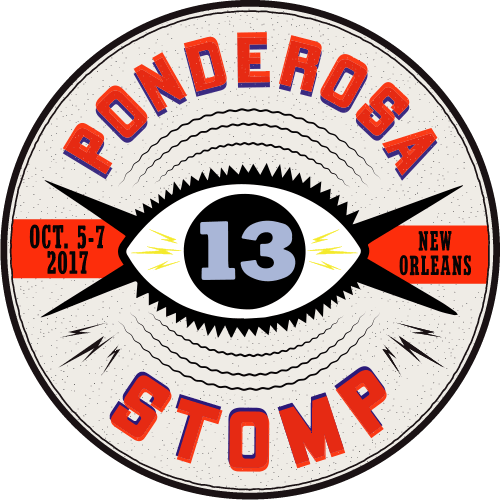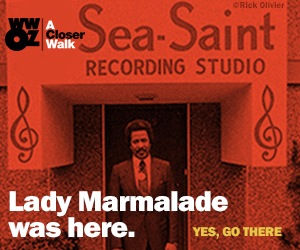WRITTEN BY BEN SANDMEL
The year 2015 sees zydeco entering its second half-century of global recognition. Fifty years ago, presenting zydeco at a roots-music event such as The Ponderosa Stomp would have been inconceivable. Back then zydeco could only be heard in southwest Louisiana and neighboring southeast Texas. Even there, on native soil, this exuberant music resounded solely within its self-contained core community, beneath the radar of mainstream culture. On the rare occasions when zydeco did attract mainstream attention, the typical reaction was one of disparagement — both of zydeco, and the French language in which it was sung — as coarse, excessive expressions of low-class ethnicity. In the conformist ethos of that era, assimilation was often conflated with patriotism.
Zydeco’s transition from passé to popular began in 1964 when Arhoolie label owner Chris Strachwitz first released records by Clifton Chenier. Chenier’s earlier records had taken aim at the R&B charts (during the ‘50s he was a label-mate of Little Richard), yet they didn’t make much noise, to use music-business parlance. But Strachwitz introduced Chenier to the folk and blues-revival circles, which by the mid-‘60s were significantly intermingling with the nascent hippie movement. This new audience went wild for Clifton Chenier’s blend of Creole folk roots, Afro-Caribbean rhythms, blues and R&B, Cajun music, and country. European influences factored in, too, in that the accordion — zydeco and Cajun music’s signature instrument — first came to Louisiana during the nineteenth century via German and Austrian immigrants. In addition, some Cajun songs also played by zydeco bands can be traced back to medieval France.
Chenier was raised amidst a pre-zydeco Creole folk-music tradition variously known as “la-la,” “pic-nic,” “ba-zar,” and “la musique Créole.” At this writing this style is still performed by the vital octogenarian accordionist Goldman Thibodeaux, who was likewise raised amidst it, and also by a great, relatively younger band called Creole United. This all-star group features such multi-instrumentalists as Andre Thierry (best known as an eclectic young hot-shot accordionist), Ed Poullard (best known as a traditional fiddler), and the father-son duo of Lawrence and Sean Ardoin. These two represent the third and fourth generations of a zydeco lineage that goes back to the iconic accordionists Alphonse “Bois Sec” Ardoin and his pioneering predecessor, Amédé Ardoin.
https://www.youtube.com/watch?v=LKKrrlgHf_M
Chenier expanded upon this la-la foundation by taking then-popular R&B songs — such as Louis Jordan’s “Caledonia” — and singing them in French while leading his band on accordion. The high-energy result was irresistible: “If you can’t dance to zydeco,” Chenier once stated, summing up his music’s raison d’etre — “you can’t dance — period.” Chenier set high standards of musicianship for zydeco that still prevail today. In that sense he is revered as a traditionalist, although his innovations actually seemed radical for his time. Today some young Creole musicians — such as Cupid, and Little Nate (the son of accordionist Nathan Williams, leader of Nathan and the Zydeco Cha-Chas) — use Chenier’s classic sound as a springboard to incorporate rap, hip-hop, and contemporary R&B. In a different vein of hybridization, accordionist Terrance Simien’s take on zydeco has strong crossover appeal to rock and jam-band audiences around the world. Such syntheses horrify purists at times. Nevertheless these eclectic mixtures represent both zydeco’s ongoing evolution and Clifton Chenier’s forward-thinking approach.
Some two decades after Chenier signed with Arhoolie, zydeco came to garner an exponentially larger following. For a time it even attained pop-culture fad status. In 1982 accordionist Queen Ida became the first zydeco artist to win a Grammy award. Chenier received that same honor in 1984. In 1987 the popular movie “The Big Easy,” with its Louisiana setting and soundtrack, further raised national awareness of zydeco and Cajun music, as well as New Orleans R&B. As one result, national advertising campaigns used zydeco to promote a wide variety of nonmusical products.
https://www.youtube.com/watch?v=Yvvy7HzyZtU
Another milestone moment in zydeco’s mainstream acceptance occurred when the band Buckwheat Zydeco, led by accordionist Stanley “Buckwheat” Dural, signed with a major record label. Soon Buckwheat Zydeco was opening rock concerts for the likes of Eric Clapton and U2. Meanwhile, a cultural renaissance within Louisiana brought zydeco unprecedented respect and acceptance at home, transforming something old, familiar, and unheralded into a source of pride. For those not familiar with this culture, however, a big part of zydeco’s appeal was its perceived exoticism — beginning with its name — which reflected a romanticized view of Louisiana as a quasi-foreign country.
The word “zydeco” is usually explained as a phonetic elision of the French phrase “les haricots” (pronounced lay-ZAH-ree-coe). This comes from the phrase “les haricots sont pas salés,” which appears frequently in Creole folk music. It was first documented in 1934, on a song from the juré/ring-shout vocal tradition entitled “J’ai Fait Tout le Tour du Pays,” by Jimmy Peters and a group of singers. Their stunning performance was recorded for the Library of Congress by folklorists John and Alan Lomax in 1934.
https://www.youtube.com/watch?v=FWtiXOPoFvY
Literally translated “the snapbeans are not salty,” “les haricots sont pas salés” is also an exclamation, and a metaphor for times that are so hard that people can’t afford to season their food. This phrase became the title of the popular folk-rooted song “Zydeco sont pas salés,” and its lead word acquired several meanings: the name of a musical genre; the gatherings where such music was played; and the steps that people invented to dance to it.
“Zydeco” was first used as a stand-alone word on a commercial release in 1950. Rising to No. 7 on the national R&B charts, Clarence Garlow’s seminal “Bon Ton Toula.” (“Let The Good Times Roll”) presented a succinct, evocative picture of south Louisiana’s distinctive culture:
You see my there, well I ain’t no fool
I’m one smart Frenchman never been to school
Want to go somewhere in a Creole town
You stop and let me show you your way round
You let the bon ton roulet
You let the mule-ay pull-ay
Now don’t you be no fool-ay
You let the bon ton roulet. …
At the church ba-zar or the baseball game,
At the French la-la, it’s all the same,
Want to have fun now you got go,
Way out in the country to the zydeco.
Garlow’s band stopped momentarily when he sang the line about zydeco, making it seem to hang suspended in time. Listening to it today evokes a dramatic sense of Louisiana music history in the making.
Ensuing years saw the word “zydeco” become this genre’s generally accepted name. The spelling was hard to establish with certainty or consensus, since it came from a language based mainly in oral/aural tradition. Eventually the current spelling emerged as the norm — it now appears in dictionaries — although some debate has continued.
Clarence Garlow brought critical mass to the word zydeco, but not to the music per se. Garlow’s forté was mainstream African-American rhythm and blues. His singing — in English, French, and “Franglais” — blended passion with sly street smarts, and his expert guitar work recalled the style of T-Bone Walker. On occasion Garlow also played accordion and sang entirely in French, both live and on several obscure records. But these forays into zydeco were insignificant compared to his R&B oeuvre, in terms both of musical quality and mass exposure. Significantly, there is no accordion on Garlow’s “Bon Ton Roula,” which also does not include zydeco’s other signature instrument: the “frottoir,” also known as the rub-board or scrub-board. Frottoirs are made of corrugated metal and are worn hanging from the shoulders like a backless vest. They’re played by scraping the corrugated ridges with spoons or bottle-openers. These two core instruments — along with bass, drums, eclectic guitar, and some combination of horns — still comprise the basic configuration for zydeco bands. Clifton Chenier used variations of this format during his thirty-plus years of recording and performing.
Chenier passed on in 1987, but one of his great long-time accompanists — Paul “Lil’ Buck” Sinegal — will perform at the 2015 Ponderosa Stomp. Sinegal (whose surname also often appears as Senegal, and whose style recalls the work of Freddie King) stands tall as of the very best blues guitarists performing today.
https://www.youtube.com/watch?v=dEt96KG4QYI
The 2015 Ponderosa Stomp will also present the great zydeco accordionist Lynn August, who has also expertly performed many other genres on a variety of instruments throughout his lengthy career.
And although Clifton Chenier is long gone, now, C.J. Chenier carries on his father’s legacy. So do the sons of the late Boozoo Chavis, in a band called the Dog Hill Stompers; John Delafose’s son Geno; Delton Broussard’s son Jeffery; and Roy Carrier’s son Chubby, among others. The continuing viability of annual events such as the Zydeco Festival in Plaisance, La. — and the continuing presence of zydeco at the Ponderosa Stomp — further underscore this great music’s ongoing popularity and its soulful power to make people dance. Here’s to the next fifty years.
Ben Sandmel is a New Orleans based folklorist, drummer, and producer. He is the author of Zydeco!, a collaborative book with photographer Rick Olivier, and Ernie K-Doe: The R&B Emperor of New Orleans. Sandmel produced and played on the Grammy-nominated album Deep Water by the Cajun-country band The Hackberry Ramblers.
COPYRIGHT BEN SANDMEL 2015, ALL RIGHTS RESERVED





